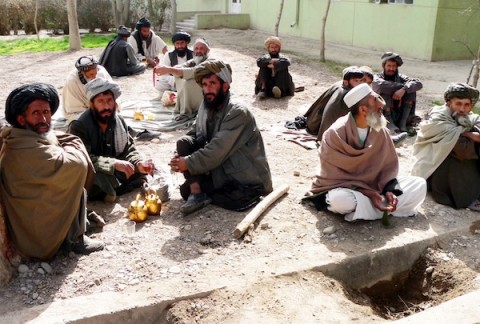‘Unlawful Deaths’ in Afghanistan?
The U.S. military will ensure any crimes are investigated fully, a spokesman says.
Jul 31, 20201.2K Shares622.6K Views
Afghan relatives wait outside a hospital in Kandahar. (EPA/ZumaPress.com)
A very disturbing — and disturbingly vague — announcement came early this morning from the U.S. military command in Afghanistan. According to Army Lt. Col. Joseph “Todd” Breasseale, a command spokesman, the Army’s Criminal Investigation Division is investigating whether an unknown number of American soldiers are responsible for the “unlawful deaths” of “as many as three” Afghan civilians.
[Security1]Breasseale’s statement leaves many key details vague, including how many soldiers are involved in whatever incident CID is investigating; specifically where it took place; and when it occurred. But whatever occurred was serious enough to get additional soldiers from the same unit to come forward to their chain of command with knowledge of the incident earlier this month. The statement makes it sound as if the potential criminal act was planned in advance of its commission, as allegations of “illegal drug use, assault and conspiracy” are involved, although it isn’t clear if those allegations have to do with the incident or with the cohort of soldiers under investigation more generally.
One of the soldiers in question is being held in pre-trial detention. No charges have been filed yet.
Breasseale said in an email that he couldn’t discuss further detail about the case right now. “The bottom line is that we are executing this investigation by the numbers and will not compromise our ability to gather and maintain evidence,” he said. He added that more specificity about the case will probably be available “once the charges are preferred,” an indication that CID’s investigation has progressed to the point where it is more likely than not that the soldiers involved will face charges.
It is unfortunately difficult to infer what incident this case involves. Over the past few months, despite the restrictions on rules of engagement that Gen. Stanley McChrystal issued last year to minimize civilian casualties, there have been several high-profile cases of civilian deaths at the hands of NATO forces. A so-called “night raid” earlier this month in Nangahar Province left locals saying 11 civilians were killed by U.S. troops, even though NATO considers all to be insurgents, and their anger led to a violent protest in which Afghan police killed someone. On February 12 in Gardez, also in Afghanistan’s east, U.S. Special Forces killed two men and three women — two of whom were pregnant — during a house raid, and had to correct an initial mistaken announcement that attributed the women’s deaths to insurgents. And although this incident doesn’t sound like the one under investigation, a misunderstanding at a Kandahar checkpoint led soldiers to open fire on a passenger bus, leaving four civilians dead.
Statistics from McChrystal’s command compiled by USA Today last month found that NATO-caused civilian casualties have risen in early 2010 from a comparable period in 2009, a disturbing increase the command attributes to an increased tempo of military operations. In a joint press conference last week with Afghanistan’s president, Hamid Karzai, President Obama expressed personal anguishover civilian casualties in Afghanistan. Before McChrystal took command in Afghanistan, he said that the perceptions of the Afghan people that the NATO coalition is interested in protecting them from harm and the Afghan government is interested in enriching their lives would be “strategically decisive” in the nearly nine-year war. His counterinsurgency guidance instructs his troops to assume additional risk to their own livesin the interest of preventing civilians from being accidentally killed. After the Paktia incident, McChrystal consolidated his holdover Special Operations Forces operating in Afghanistan.
The U.S. military command in Afghanistan “is committed to the security and safety of the Afghan population,” Breasseale’s statement concluded, “and will ensure any crimes are investigated fully and those responsible will be held accountable.”

Hajra Shannon
Reviewer
Latest Articles
Popular Articles
